 |
 |
|---|
Presents:
Panel Discussion "Is a Peace Constitution Outdated? Japan Considers Rearmament"
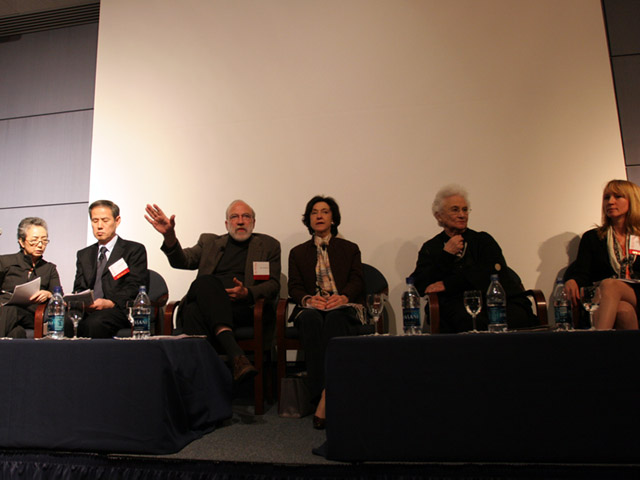
Date: April 25th, 2007
Time: 6:00 - 6:30 registration; 6:30 - 8:30 discussion; 8:30 - 9:00 reception
Location: New York Asia Society and Museum Rose Hall, 725 Park Ave, New York
Panelists:
Moderator: Carol Gluck (George Sansom Professor of Japanese History, Columbia University)
In New York, Think about Japanese Peace Constitution "Article 9" in the World (5/27/2007)
Shinya Watanabe
On April 25, 2007, prior to the art exhibition, the panel discussion event on Japanese Peace Constitution Article 9, hosted by Atomic Sunshine Exhibition Committee and Asia Society, was held.
After the short speech of Asia Society President Vishakha N. Desai, Professor Carol Gluck briefly talked about the historical meaning and the transition of the roll of Article 9 before introducing all the panelists. It was short, but insightful and accurate speech.
The first panelist was Beate Sirota Gordon, and she talked about her experience in those days with great humor.
Beate was summoned by General Courtney Whitney who works for Douglas MacArthur, the Supreme Commander of the Allied Powers, and was ordered to write a draft of Japanese Constitution with other 20 members. She was stunned, especially about the short schedule; she was allowed only 7 days to finish the draft. Beate was in charge of civilian right chapter, and since Beate was only the woman in the team, she was suggested by Col. Roest to write a right of woman. Furthermore, from Col. Kades, she received a message that because of the order from Washington D.C., some articles needed to be included in Japanese Constitution, and moreover, GHQ adopted many ideas from Japanese civilian's constitution research group "Kenpo Kenkyu Kai (Constitution Research Group)".
Before World War II, Beate saw the inconsiderate situation of Japanese women who do not have a freedom of marriage, right of inheritance and divorce, and it became her motivation to write a chapter of woman's right. However, because of her chapter of right of woman became two pages long, Col. Kades asked her that Japan has more right of woman than American woman. Then, she answered, yes, because in the US constitution, you cannot find the word gwomanh. When Col. Kades suggested that these chapters need to be not in the constitution but in the civil law, Beate cried and appealed that if constitution do not have a chapter of woman, it is impossible to keep the right of woman. Because of this, the Article 24, the right of woman, was protected.
Furthermore, Beate mentioned that this constitution has suits Japan, and if Article 9 were known before Iraq War, how wonderful it could be.
Mr. John Junkerman talked about why he decided to make a film which motifs Article 9.
In winter of 2004, Liberal Democratic Party manifested that in year 2005, the 50th anniversary of LDP's founding, they will do drastic change of Japanese Constitution. Since then, Mr. Junkerman started to hurry the production of this film. He was trying to go back to the origin how it was created, but when he tried to produce a film, since the drafting of the constitution is already 60 years ago, Japan's memory of that time and the people who knows the process of it became really rare, and it was difficult to make this film. Furthermore, the population who knows about that time became relatively small, so the meaning of Article 9 became difficult to appreciate.
Also he mentioned that it is impossible to solve international conflict and create peace by using weapon, and Japanese people who experienced 15 Years War understand this very well. As a result, in the 20th century, the century of trying to find the alternative way to solve international conflict, Japan started to have a constitution which renounces war to solve international conflicts and killing of other country's citizen, and this is extremely significant, he said.
The third panelist Kunio Suzuki mentioned that Japanese Constitution need to be reviewed once. His idea is such as below.
For example, there are many people who want to change the constitution, such as, freedom of speech need to be more emphasized, capital punishment should be abolished, and an appeal for nuclear disarmament should be made to the world. In other words, they are thinking about gthe democratic amendment of the Constitutionh in their hearts.? But, if such words were spoken, one would become caught up in the Liberal Democratic Partyfs Constitution amendment argument, and Article 9 would be amended. That is what many of these people are afraid of. Therefore, these people are opposing amending the Constitution, contrary to their own inclination, but if we do not talk about amending the constitution now, LDP will change the constitution as they want.
Mr. Suzuki criticized that LDP tries to create so called autonomous constitution, just to make a military which can be dispatched to anywhere with the US military. However, an gOccupational Constitution with freedomsh is much better than the gAutonomous Constitution without freedomsh recommended by the Liberal Democratic Party.
If people wish to protect Article 9, Self Defense Force which violate Article 9 need to be abolished. If we have to admit Self Defense Force, we can add that to Article 9. However, the situation can go much further. Then, Mr. Suzuki suggested setting a break to avoid that the conversation goes too far.
For example, to confirm three points: gBear no nuclear weapons.? Dispatch no troops overseas. Have no military drafth, will make the person who want to protect Article 9 to reassure to join the discussion. Also, Japan is the only country on which atomic bombs were dropped, and because of this, Japan alone gfrom the point of view of "self defenseh should be the country entitled the right to bear nuclear weapons. However, Japan relinquished that right permanently, so no other country should have the right. That should be clarified in the Constitution and appealed to the world.
Suzuki claims that Japan should recognize self defense force, not as a military or national security military, but as todayfs self defense force. Further, in future that should be abolished as well to come closer to the idealism of Article 9, and it need to be written. While Japan has a Constitution that denies militarism, the National Police Reserve was created in 1950, and that became the National Safety Force in 1952, and the Self Defense Force in 1954.? Then, this course can be back tracked. National Police Reserve is the gPoliceh, so that Japan would have no military, so an appeal could be made to the world to glearn from Japan.h It was a magnificent speech, such as speaking from the Japanese election campaign car.
The last speaker Frances Rosenbluth used charts, and by comparing Japan and Germany in post war period, she mentioned her point of view toward constitution.
According to the pole, the percentage of Japanese people who support active foreign policy, self defense forces, and also support Japan lobbying for the position on United Nations Security Council is becoming high, but the people who recognize themselves as a nationalist does not change. She explained this puzzle by comparing Japan and Germany.
Because of geographical and political reason, Germany was imbedded in multilateral security treaty with its former victims. It made Germany imperative to make peace in genuine way, and it was genuinely accepted by Germany's former victims. Japan, on the other hand, had a bi-lateral treaty with the United States, and because of it, Japan's security was guaranteed by the United States regardless of Japan's relationship with its neighbors. So there is not the same kind of international pressure on Japan from the beginning, to make the genuine peace with its neighbors. These result in the difference of recognition of history, and history textbook problem.
In 1994 Japan changed electoral rules to proportional representation system, and it create the system which the political left, is relatively weak, certainly compare to the Germany which have a very strong leftist party, even with proportional representation system. However, even the right in Japan has to be poled also to the middle. There is a kind of nationalism such as supporting Japan's public international role, but it is a kind of cool nationalism, and will not cause same kind of military adventurism of pre-war period.
After all of these speeches, there are questions and answers between the panelists, and then, with audiences.
From American people, there is a question such as there are any Japanese person who want to appeal Article 9 in global scale such as United Nations, and why there are two theory of Article 9, one is imposed by the US, or it was a Japanese original idea, or whether the Self Defense Force is illegal or not, or some specialty questions such as Japanese conservative media are guiding the poles, such as this.
It is hard to put together this two hour conversation, but I want to release this by publishing this whole conversations.
The scenes, such as Mr. Suzuki ask to the US audience how much they know about Article 9, and Mr. Junkerman who knows the situation of both the US and Japan mediated Japanese and American panelists, made this discussion event incredibly meaningful. Also the amazing moderation of Carol Gluck and Beate-san's humorous speech and interesting story, and the indication of Frances Rosebluth with huge amount of information and research made this event profitable.
According to report, the people who know the existence of Article 9 in the US are no more than 30,000. In this situation, with these unusual members, to talk about Japanese constitution with the real drafting member was truly miraculous. As a curator, it is such a pleasure to organize this event which leads to mutual understand, such as a platform of the art exhibition.
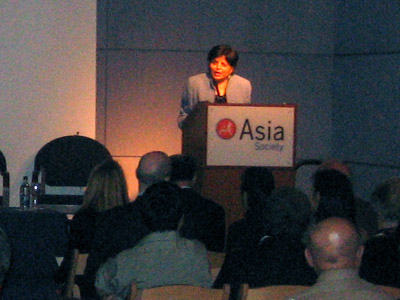 |
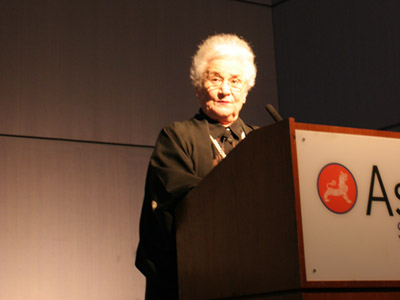 |
|---|---|
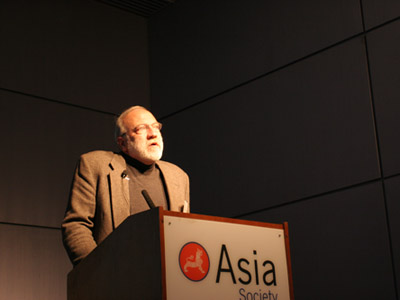 |
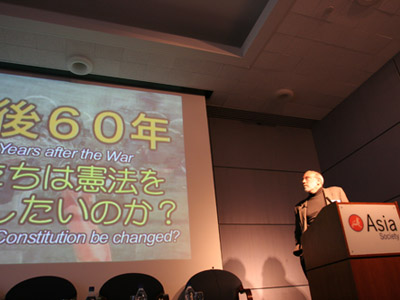 |
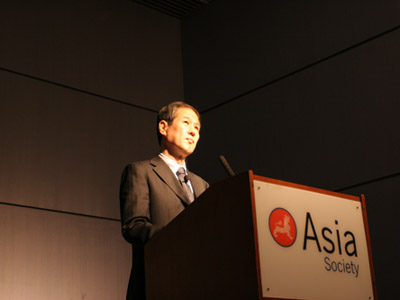 |
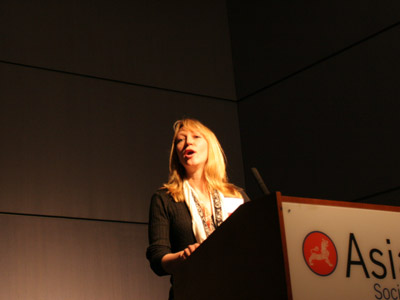 |
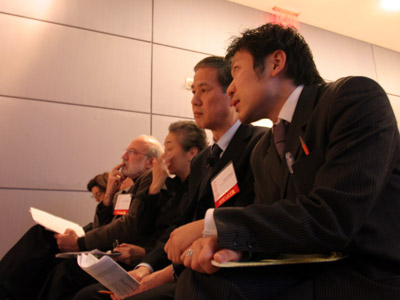 |
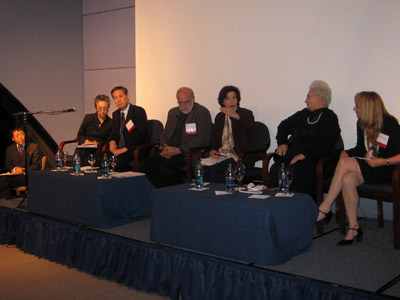 |
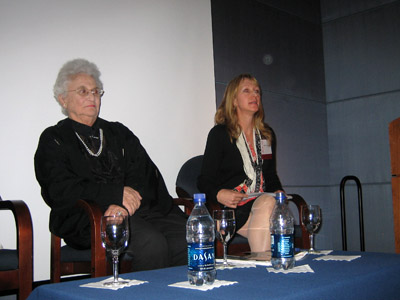 |
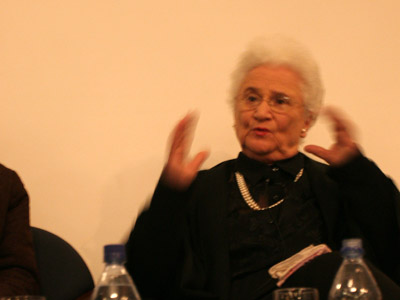 |
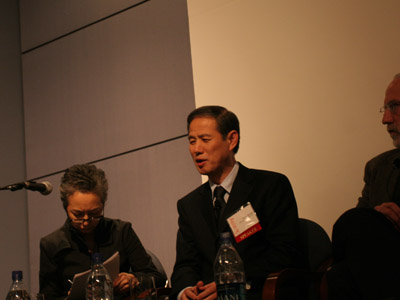 |
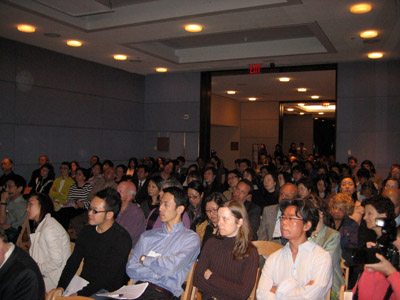 |
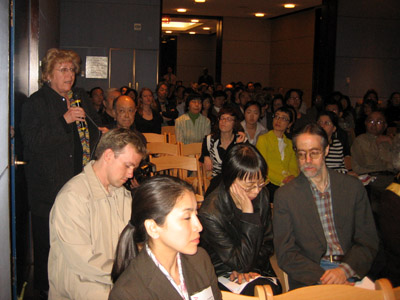 |
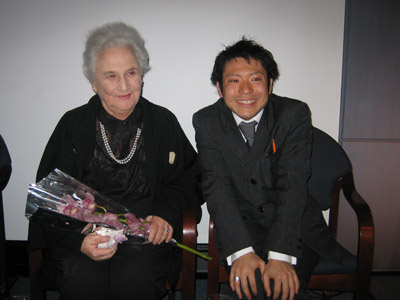 |
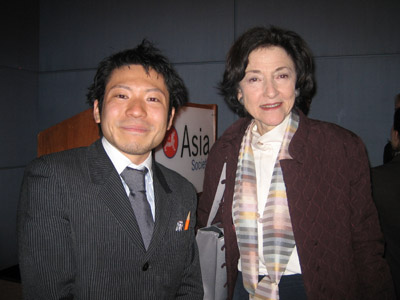 |
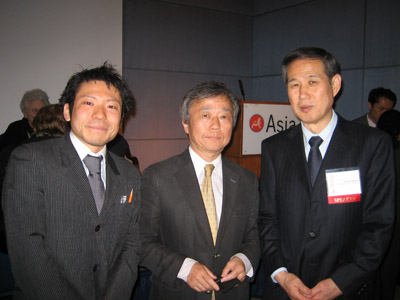 |
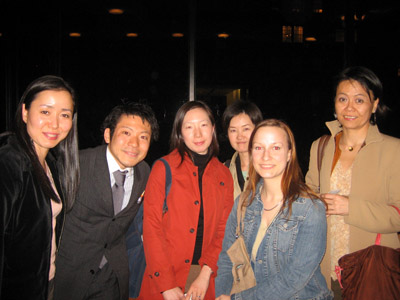 |
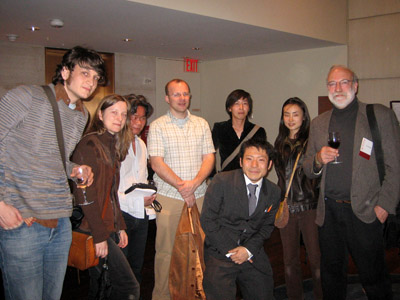 |
Photos by Yasushi Tamaki and Takeshi Ito. Thanks!
Facing heightened global engagement, resurgent Japanese nationalism, and the reality of a nuclear North Korea, Japan is considering taking steps - for the first time in 60 years - to revise its Constitution to abandon its unique peace clause adopted after World War II. Is this a justified move? How would it affect Japanfs relationship with its neighbors and the U.S.?
This event is sponsored by

Special Thanks To:
First Run Icarus Film, Kenji Naruse, Yasushi Tamaki, Jeri Hamilton and Bob Ruenitz, NYU Steinhardt School of Culture, Education, and Human Development, MFA program, Nancy Barton, Tammy Brown, Curt Confer, John Torreano and Hiroshi Sunairi.
and support this project!